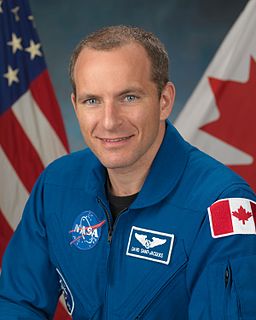A Quote by David Saint-Jacques
Space is our tool to take care of the world. From space, we know the Earth is fragile, and we can follow oil spills and forest fires, and monitor the environment and save it. The needs of remote communities and the needs of astronauts are similar. Canada is a country that is big and has a lot of people living in faraway places. Physicians in remote areas need to have contact with more senior colleagues. We depend on telehealth for advice, X-rays, labs. At the most simple technical level, space technology contributes to remote health care.
Quote Topics
Advice
Areas
Astronauts
Big
Canada
Care
Colleagues
Communities
Contact
Country
Depend
Earth
Environment
Faraway
Faraway Places
Fires
Follow
Forest
Forest Fires
Fragile
Health
Health Care
Know
Labs
Level
Living
Lot
Monitor
More
Most
Need
Needs
Oil
Oil Spill
Our
People
Physicians
Places
Rays
Remote
Save
Senior
Similar
Simple
Space
Spills
Take
Take Care
Technical
Technology
Tool
World
Related Quotes
The ultrasound that has application not only in space for a long mission or for a mission to the Moon or Mars, but also in remote areas on the Earth. Not even just - I'm not even talking about expeditions like to the Antarctic, but just a remote area, a small town somewhere. The local doctor is not going to know everything, and so if that person can link in with a diagnostic ultrasound to the hospital in New York City through the internet, then they can do a very quick diagnosis of something that's wrong with someone that's in this remote area.
Half of one per cent of the U.S. budget is space-related stuff. In Canada, we spend more on dog foodScreen Shot 2015-08-19 at 2.39.35 PM. Space flight is intrinsically international and very modern. It's like a co-op. Every country provides services. In Canada, we have a focus on robotics in the shuttle and space station. In exchange, we get research time for our scientists and astronauts' flights. Our contribution is as a junior partner.
There are three reasons, . . . apart from scientific considerations, mankind needs to travel in space. The first . . . is garbage disposal; we need to transfer industrial processes into space so that the earth may remain a green and pleasant place for our grandchildren to live in. The second . . . to escape material impoverishment: the resources of this planet are finite, and we shall not forego forever the abundance of solar energy and minerals and living space that are spread out all around us. The third . . . our spiritual need for an open frontier.
The frontier in space, embodied in the space colony, is one in which the interactions between humans and their environment is so much more sensitive and interactive and less tolerant of irresponsibility than it is on the whole surface of the Earth. We are going to learn how to relate to the Earth and our own natural environment here by looking seriously at space colony ecologies.
The Americans are still the leaders in human space flight. I feel we have a danger here of kind of stagnating. We're kind of resting on our laurels and there's a danger going forward if we don't take bold steps to really support human space flight in this country that we could fall behind. After the space shuttle is retired, we're going to have a big gap, five to seven years, at least where we're not going to have the ability to send our own astronauts into space, we'll have to buy rides on the Russian Soyuz, and so that will be a pretty big step down for us.
If we're not able to launch our own people and operate our own spacecraft anymore then, you know, space - whether it should be or not, it's seen as like a harbinger of technology. If you can fly people into space, if you can operate into space, then you've got high technology and if you're the leader of that, then you're the leader in technology. If we lose that on a more or less permanent basis, or for a long period of time, my fear is that it will creep into the national psyche in all areas and we as a nation as a whole will kind of be diminished.





























